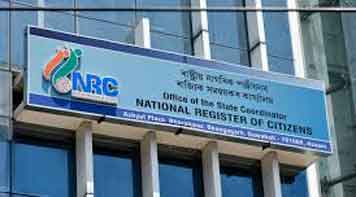A survey carried out by the Citizens for Justice and Peace (CJP) has revealed that ten District Legal Services Authority (DLSA) offices in Assam were not only “woefully ill-equipped” but could also get “completely overwhelmed” when those excluded from the National Register of Citizens (NRC) approach the DLSAs legal aid.
The Mumbai-based human rights organisation released the findings of the survey on Thursday, three days after filing a petition before Gauhati High Court seeking directions to the state to formulate effective and robust modalities for legal aid in terms of having trained panels of lawyers and adequate front offices in light of the impending appeals to be filed before Foreigners Tribunals by people from marginalised sections to prove their citizenship. The next date of hearing is April 5, 2021.
According to the survey carried out between September to January, the ten DLSAs found wanting on vis-a-vis personnel, infrastructure and other facilities included Baksa, Barpeta, Bongaigaon, Chirang, Darrang, Dhubri, Goalpara, Hailakandi, Kokrajhar and Udalgiri.
“After it was discovered that more than 19 lakh people had been excluded from the final NRC, CJP swung into action to provide paralegal and legal assistance to those excluded from the final NRC. This is how CJP’s Assam Team noticed that there was a lack of concerted efforts being made by the state government for providing legal aid to those excluded from NRC, as directed by the ministry of home affairs (MHA),” the CJP said in a statement.
Located in district courts complex, a DLSA provides free legal services to the weaker sections of the society, among others.
Zamser Ali, the chief adviser of the Assam Chapter of the CJP, told The Telegraph that the survey was carried out between September and January.
“Our findings reveal that these DLSAs are presently overburdened with FT cases. These are not only woefully understaffed but also undertrained.
“Therefore, it is our request that they be made effective and all lacunae fixed to address both FT cases and the NRC cases .
“To deal with 19,06,657 cases of the NRC excluded, we will need a huge number of lawyers who are also trained in dealing with citizenship issue because the nature of the case is different,” Ali, 49, said, adding at present it was providing legal aid to around 100 people in the FTs.
The NRC is a register of genuine Indian citizens and the updated NRC was published in Assam on August 31, 2019.
The CJP’s Assam team conducted the survey to verify the claims made by the Assam State Legal Services Authority (ASLSA) about availability of personnel and other resources to deal with citizenship related cases, once those excluded from the NRC start getting their reasons for rejection. The objective of the survey was to test the Assam government’s claims about the spread and expanse of the DLSA.
“Over 19 lakh people who have been excluded from the NRC are expected to defend their citizenship before Foreigners’ Tribunals (FTs).
Most of them belong to financially and socially backward communities and cannot afford to pay for legal services required to present their case before the designated FT. They will rely on DLSA lawyers and paralegal volunteers,” the CJP said.
Overall the findings found that these 10 districts have about 273 active advocates
devoted/appointed especially for legal aid, and 333 Para Legal Volunteers (PLVs); the minimum qualification of PLVs in seven districts is Class VIII pass, in Chirang it is Class X pass, in Goalpara the PLVs are Higher Secondary (HS) pass to Graduates and in Dhubri the minimum qualification is HS.
Moreover, in none of the 10 districts surveyed, has any training on the citizenship, immigration, NRC, Foreigners Act, etc. been provided so far.
The team also discovered that some of the DLSA staff (like in the case of Barpeta) was contractual and that the criteria of selection and reselection appeared arbitrary. In some places there was a fixed tenure, in others there was no limit and people could be reselected depending upon the senior official’s decision.
“Also, it is difficult to gauge the nature of communication between DLSA officials and people seeking legal aid, as it was office staff of the DLSA, and not the lawyers or paralegals that initially spoke to the people who came for legal aid.”
As far as front office was concerned, there was “none” in Dhubri and Baksa and in few it was “very” small (Barpeta) and others were “badly” maintained (Darrang) and inadequately staffed (Udalguri, Goalpara), among others.
The CJP harped on the mindboggling numbers that will confront the the FTs once the NRC cases pour in. Extrapolating from data available from 10 districts, there are less than 1,000 advocates (273 x 3.3 = 900.9) in the DSLAs in the total 33 districts of Assam, the CJP said
“Assuming all 19-lakh people go to 1,000 DLSA advocates, each advocate will have to handle 1,900 cases! Assuming each case requires a minimum of at least three hearings to provide documentary evidence and then witness testimony to authenticate the presented documents, and the day the FT passes its order, each advocate will have to handle 5,700 hearings!”
“Now assuming they handle three FT hearings a day, given that their other non-citizenship related cases also require attention, they will still spend a bulk of 1,900 days on FT hearings, which comes to more than 5 years… at the very least!
“This does not include the time spent on getting information on the case in the first place and arranging for documents and witnesses,” the CJP said.











